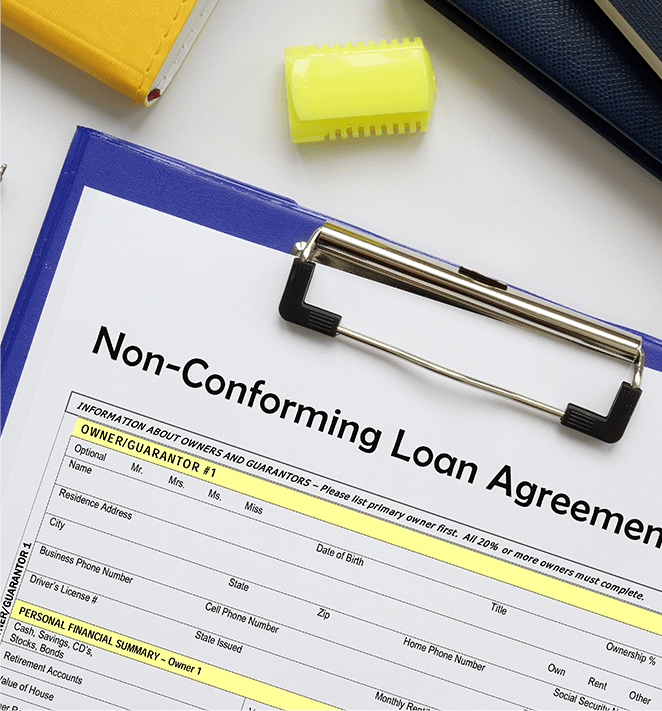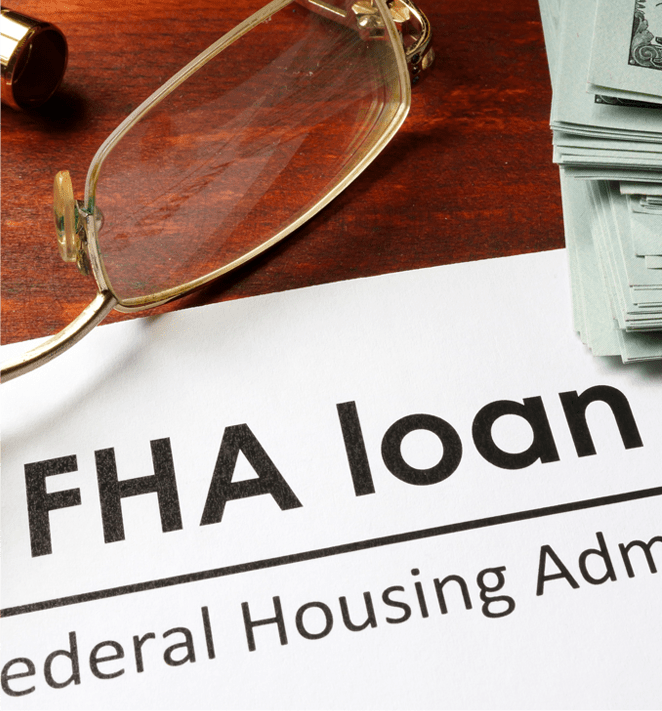Whether You Are First Time Home Buyers, Refinancing Home Owners, or Beyond, I Can Help You Find The Right Loan Program!
Conforming &
Non-Conforming
Agency Loans
A conforming loan meets standards set by Fannie Mae and Freddie Mac, as well as by the Federal Housing Finance Agency (FHFA) that regulates them. Fannie Mae and Freddie Mac’s standards govern the maximum mortgage loan limit, required credit score and debt-to-income (DTI) ratio, maximum loan-to-value ratio, and minimum down payment. Conforming loans are widely available. Almost all lenders offer them.
On the other hand, Non Conforming loans don’t meet Fannie Mae and Freddie Mac purchase guidelines. Two of the most common types of nonconforming loans are Government-backed loans and jumbo loans.


Conventional, VA,
& FHA Mortgages
Conventional loans are readily available through banks, credit unions and online lenders all around the country. They are usually perfect fits for borrowers with good or exceptional credit. FHA loans are government-backed by the Federal Housing Administration (FHA) and typically have flexible qualification criteria compared to conventional loans, so they are ideal for borrowers with lower credit scores and income. VA loans are also guaranteed by the federal government through the U.S. Department of Veterans Affairs (VA) and cater to active-duty military, veterans and surviving spouses.
Portfolio Jumbo Products
A jumbo loan is a type of financing that exceeds the limits set by the Federal Housing Finance Agency and cannot be purchased or guaranteed by Fannie Mae or Freddie Mac. The Federal Housing Finance Agency (FHFA) sets the jumbo limit annually. Those looking to buy a home must undergo rigorous credit requirements compared to applicants that are looking for a conventional loan.


Aggressive NON-QM Loan Products
A Non-QM loan (non-qualified mortgage) is a type of mortgage product that allows borrowers to qualify based on alternative methods, such as bank statements or assets as income. Because of the flexible qualification requirements, Non-QM loans open up home purchasing opportunities to a larger group of individuals. This type of loan is not required to meet the federal government and Consumer Financial Protection Bureau’s (CFPB) guidelines for qualified mortgages.
Private Money Financing for Residential and Commercial
A private money loan is generally a short-term loan used to purchase or refinance real estate assets. The loans are provided by private lenders, as opposed to traditional financial institutions such as banks or credit unions.


Down Payment Assistance Programs and Portfolio Programs for Less than Perfect Credit Profiles
Can’t afford the down payment on the house of your dreams? Down payment assistance programs help first-time home buyers acquire grants, loans and other forms of financing. Eligibility is determined by your household income and credit history, varying by state and program. For those with a less than perfect credit profile, I can find the perfect fit for you!

What Our
Clients Are Saying
★ ★ ★ ★★
“Luis and his team were great to work with, they were very responsive to my questions and guided me thru the whole process. I would strongly recommend his services to Friends and Family.”
★ ★ ★ ★★
"This was an excellent experience as a first time home buyer."
★ ★ ★ ★★
“Luis and his team were great to work with, they were very responsive to my questions and guided me thru the whole process. I would strongly recommend his services to Friends and Family.”
★ ★ ★ ★★
"This was an excellent experience as a first time home buyer."
★ ★ ★ ★★
“Luis and his team were great to work with, they were very responsive to my questions and guided me thru the whole process. I would strongly recommend his services to Friends and Family.”
★ ★ ★ ★★
"This was an excellent experience as a first time home buyer."
★ ★ ★ ★★
“Luis and his team were great to work with, they were very responsive to my questions and guided me thru the whole process. I would strongly recommend his services to Friends and Family.”
★ ★ ★ ★★
"This was an excellent experience as a first time home buyer."
FAQ
Need Help?
Read Popular Questions
What Are the Pros and Cons of Conventional Loans?
Pros: Why you should consider a conventional mortgage
- You have more choices in mortgages Conventional mortgages either come with fixed-interest rates for the full term of the loan, or Adjustable-rate mortgages (ARMs) which have an initial low fixed-interest rate and once the initial period is over, the interest rate will adjust every 6 months. Fixed-interest rate mortgages commonly come with 15-, 20-, and 30-year loan terms. This means your interest rate will remain the same for the length of the mortgage, and you’ll have to pay off the mortgage over the agreed-upon time. Adjustable-rate mortgages (ARMs) have an initial low fixed-interest rate during the introductory period of the loan. Once this introductory period is over, the interest rate will adjust every 6 months.
Fund fact: Your credit score impacts the interest rate lenders will offer you.
- You have more control over mortgage insurance, if you have to pay PMI, your PMI payments will automatically stop once your home equity reaches 22%. Home equity is the difference between the amount you owe on a property and the property’s current market value. To save even more on PMI payments, when your home equity reaches 20%, you can ask your lender to remove PMI from your mortgage fees. In contrast, if you get an FHA loan and make a down payment of less than 20%, you would be required to pay a mortgage insurance premium (MIP) for the entire length of your loan.
- You can borrow more money If your credit score is over 700 and you meet the other jumbo loan qualifying criteria, you can borrow up to $1.5M. If your credit score is above 740 and you meet the other jumbo loan qualifying criteria, you can borrow up to $3M.
Cons: Why a conventional mortgage may not be right for you
- Your credit score is below 620. The eligibility requirements for conventional loans are more stringent than government-backed loans. Conforming loans are sold to Fannie Mae or Freddie Mac soon after being created to help keep mortgages affordable for homebuyers. Once a Fannie or Freddie buys a loan, the lender can use the money from the sale to fund more mortgages. While this is for the greater good of all homebuyers, on an individual level, if your credit score is low, you may find it challenging to qualify for a conventional loan.
- You have a high debt-to-income ratio (DTI). Debt-to-income ratio is the difference between your gross monthly income and the total amount you need to pay toward debt each month. If you spent half your monthly income on bills and debt, your DTI would be 50%. Many mortgage lenders will not approve a conventional mortgage for homebuyers with a DTI higher than 43%. On the other hand, FHA loans can be approved for homebuyers with DTIs up to 50%.
Fund Fact: Homebuyers with DTIs up to 50% may also be eligible for a conventional loan with Better Mortgage.
- You have had past bankruptcies and foreclosures. The eligibility criteria for government-backed mortgages are more relaxed. As a result, past bankruptcies and foreclosures are forgiven much faster. Homebuyers with recent bankruptcies or foreclosures which would otherwise be approved may need to wait longer before a lender approves them for a conventional loan. And in some cases, the homebuyer’s loan may not be approved at all.
What Types of Homes Can I Buy with Conventional Loan?
A conventional loan could be used for the following purchases:
- 1st home purchase
- 2nd home purchase
- Vacation homes
- Rental/Investment Properties
- Multi-Unit Dwellings
- Condominiums
- Planned Unit Developments
What & How Much is a VA Funding Fee?
The VA funding fee is a one-time payment that the Veteran, service member, or survivor pays on a VA-backed or VA direct home loan. This fee helps to lower the cost of the loan for U.S. taxpayers since the VA home loan program doesn’t require down payments or monthly mortgage insurance.
| If your down payment is… | Your VA funding fee will be… | |
|---|---|---|
| First use | Less than 5% | 2.3% |
| 5% or more | 1.65% | |
| 10% or more | 1.4% | |
| After first use | Less than 5% | 3.6% |
| 5% or more | 1.65% | |
| 10% or more | 1.4% |
Is Luis Tipacti Licensed by The State?
Yes, Luis Tipacti is licensed by the state of California and is required by law to take a class once a year to renew his license. Every licensed official will have an NMLS number and their information is showcased on the Government’s official NMLS webpage.
Luis Tipacti NMLS# 281077
Can I get a loan if I am not a U.S. Citizen?
Just because you’re not a U.S. citizen doesn’t mean home ownership is out of reach. Lawful permanent or non-permanent residents can apply for loans just the same as citizens, no higher costs, fees, or interest rates required.